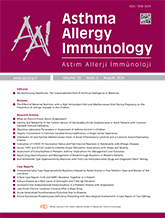


Objective: Atopic dermatitis [AD] is a common chronic inflammatory skin disease. Although numerous indicators have been investigated, reliable biomarkers are still needed to objectively measure the severity of AD. We aimed to evaluate serum thymus and activation regulated chemokine (TARC) and squamous cell carcinoma antigen (SCCA2) levels in infants with AD, and the relationship between these biomarkers and atopy and severity.
Materials and Methods: Forty-two children with AD and 42 healthy controls were included in the study. The severity was evaluated via SCORAD at the baseline, 1 month, and 3 months. Food-specific Ig E (sIgE) and/or skin prick tests were performed to determine food sensitivity in the AD group. Serum TARC and SCCA2, complete blood count parameters, and serum total IgE were measured in the AD group.
Results: Analysis showed that 54.8% of the AD group were mild to moderate and 45.2% were severe. Food sensitivity was present in 42.9% of the patients with AD. There was no difference between AD and control groups in terms of serum TARC and SCCA2 levels (p>0.05). Serum TARC levels were higher in the AD group with food sensitivity (p=0.033). A high degree of positive correlation was determined between food sIgE values and serum TARC levels in the AD group (r=0.517, p<0.001). A significant positive correlation was observed between serum TARC and SCCA2 levels in the AD and control groups (r=0.600; p<0.01, and r=0.830, p<0.001, respectively).
Conclusion: Serum TARC levels were high in AD patients with food sensitivity. Serum TARC and food sIgE values were positively correlated. Serum TARC levels may be associated with food sensitivity in patients with AD.